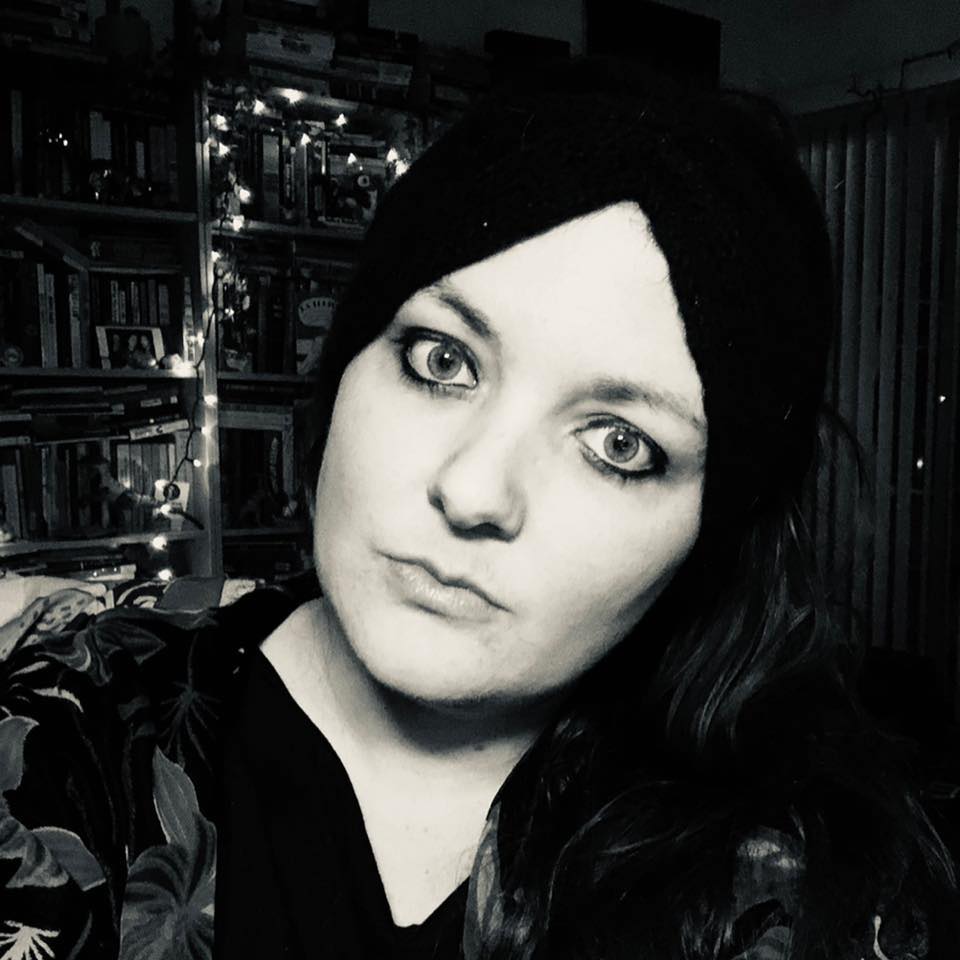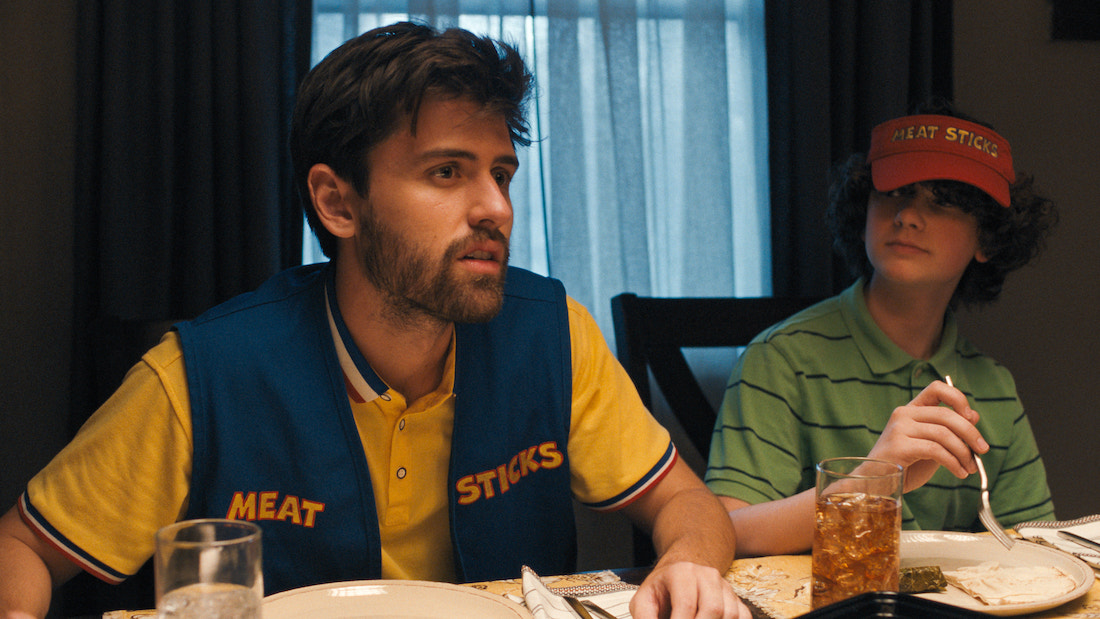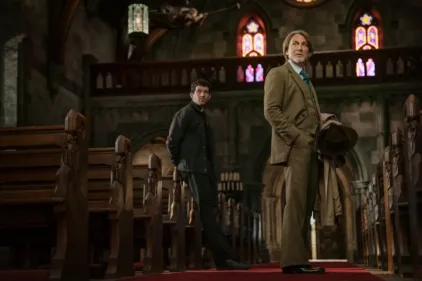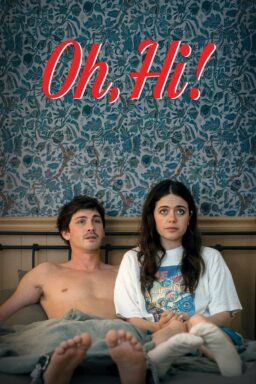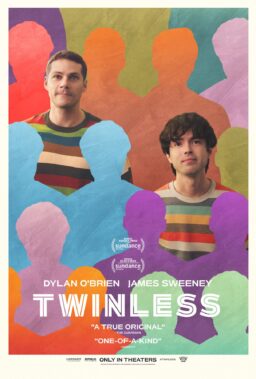Writer/director/actor Cooper Raiff has managed to release two festival darlings despite the pandemic hampering the festival circuit for the last few years. His debut feature film “Shithouse” was poised to premiere at the 2020 SXSW Film Festival. Although it did not have a physical premiere, it went on to win the Best Narrative Feature award at the delayed online version of the fest, and was later acquired by IFC Films.
His second feature “Cha Cha Real Smooth” was meant to premiere in person at this year’s planned hybrid Sundance Film Festival. Unfortunately, history repeated itself, and the festival pivoted to virtual only due to the Omicron variant. The film received a warm reception from online audiences and critics alike, who praised the film for its radical empathy. Apple TV+ acquired the film for $15M, making it the biggest sale of the festival.
In the film Raiff plays Andrew, a recent college graduate who finds himself adrift. His not-quite girlfriend has left to study abroad. His search for a job at a non-profit has landed him working at a pretzel shop in the mall. He’s sleeping on the floor of his younger brother’s bedroom. A chance connection with a woman named Domino (Dakota Johnson) and her autistic daughter Lola (Vanessa Burghardt) at a Bar Mitzvah shakes up his life, but slowly he learns a hard lesson about love, commitment, and the importance of boundaries and self-care.
A few weeks ago at the Chicago Critics Film Festival, RogerEbert.com spoke to Raiff about filmmaking in the age of Covid, his creative partnership with Dakota Johnson, the post-college life crisis in film, and what it was like to finally get his festival moment at this year’s SXSW Film Festival.
I first saw the film as part of this year’s virtual Sundance and there was a lot of chatter online about the film’s radical empathy. How do you think you achieved that and was that even a goal you had in mind?
I don’t think it was a goal I had in the front of my brain, but I really love every character in the movie, and I care about them. My whole goal with making movies is to make the audience love them and understand them as much as I do, so I think that’s the empathy of it.
I read an interview you did coming out of Sundance where you described how you wanted to balance the big open heart of Andrew, the character you play, with the importance of self care, and his realization that there are some boundaries that shouldn’t be crossed for you, or for the people that you care about. Can you give an example of how you show that in the film?
Yeah, with the stepdad Greg in the car at the end tells him there are boundaries that come with professional gigs. It’s funny. I think a lot of people think that Andrew is so sweet, such a great, nice guy and for me he just has no boundaries whatsoever. It’s really important if you really want to love someone to know who you are, and know how to navigate certain things. I think with a lot of people like that, because I can relate, people who dive so far into other people’s worlds and are trying not to deal with themselves in any way, those people can also hyper focus on one or two people and then totally neglect the other people in their lives. I think Andrew really neglects his brother. Or like in the situation where Lola is getting bullied, sure it’s cool that he’s sticking up for Lola but, trying to terrorize a little kid. It’s important to have boundaries as a person, and it’s romantic to think that you can drop everything at any point to be there for someone and help them through something, but really the biggest thing is boundaries.
You mentioned the importance of knowing yourself, and I see this film in the canon I like to call “post-college life crisis movies” like “Adventureland” where you’re in your early 20s and starting out on shaking legs. Why do you think those movies are so dependably resonant with people?
We’re all really floating and would love to latch on to something to ground us and I think because capitalism is so warped, that is so hard to really relate to on an emotional level. So that period where you’re not necessarily thrown into your work yet, that’s why they’re so resonant. “Adventureland,” where they’re all working at this rundown amusement park, speaks more to our instincts as human beings and our interior life as opposed to my job is my life.

Could you talk a bit about the casting process and how you cast both Dakota Johnson as Domino and Vanessa Burghardt as Lola, and how as an actor/director worked on having chemistry with them?
Dakota, I’ve always been a massive fan of and I knew I would have chemistry with her. I met Ro Donnelly, her producing partner and pitched her the idea for this movie. I was like I think Dakota would be great as the mom. Then we met with Dakota really short afterwards. She was in Greece and it was late at night for her. Ro was on the call too. We just hit it off. I spent most of the beginning of the call just telling her that I think she’s such an amazing performer and how she’s so specific and I wanted to write a character for her to have all of the room to do what she’s so good at. Then she was like, cool, let’s do it. So she was really my writing buddy throughout the whole process. She was a producer on the movie, but she was more like a ghost director and co-writer.
For the three kids in the movie, we did a search across the country and the casting director Angela Demo went through so many tapes and found so many different amazing people. When I saw Vanessa’s tape, I was like crying my eyes out. I was like, that’s Lola. She wasn’t super similar to what I had written, honestly, but I just knew that it was her, and I was gonna change everything according to how special she was.
This is a party movie, but you made it during the height of COVID and COVID protocols, which created a slight shift in the way films are made. Can you talk a bit about the challenges of those two elements?
It was funny. We set out to make a party movie thinking we were going to make it right after COVID. So it was a response to COVID. The first idea I had was well into COVID, and I was like it’s a friggin’ party movie so that we can actually be back in and go to Sundance and be in theaters and have a great time. COVID protocols were intense when we made the movie, but not as intense as they were at the beginning. It sucks because we didn’t have that many extras and we were wearing masks and making movies with masks is hard. It was weird.
Do you have any tricks to make the parties look more filled than they were?
I think about that first flashback scene all the time. That day of shooting we tried to get wider, but at some point I was like, let’s just stay on the kid’s space. If you look at that whole first initial flashback scene, it’s like no one. There’s so few extras. It’s just about staying close with the framing. And really, it’s the sound design. The guys who did the sound made the room sound so massively full. Truthfully, we shot every party scene in an abandoned mall. Like shooting stuff in a hibachi grill and cheating it to make it look like a big event center.
Was that actually in New Jersey or Atlanta?
It was in Pittsburgh.
Ah, like “Adventureland.”
There you go. It’s all connected.

Your first film “Shithouse” you made before COVID, but it didn’t get to play festivals, although it won the Grand Jury Prize.
Yeah, SXSW was the very first festival that got canceled.
Then with this film it was able to play Sundance, but virtually only, before playing a myriad of other festivals. How you feel about releasing both your films through festivals in the time of COVID?
I don’t know. My first movie festival experience was like all in my PJs. Then with Sundance it was also in my PJs. I was with my girlfriend and my best friend, and I was constantly on my phone. They’re like, dude, enjoy it. I was like, this [gestures at phone] is my Sundance. Let me be at my Sundance. But then we showed it in person at SXSW and that was the best night of my life. It felt so like why you make movies. I think I missed that with “Shithouse.” I made “Shithouse,” and then I didn’t have any experience of showing it to people. So I was just like, well on to the next one. Then with “Cha Cha,” after Sundance [in person] got canceled it was like the same thing. On to the next one. But, no, this is the reason why you make a movie. To enjoy the fruits of your labor.
And you got to see it with an audience at SXSW?
Yes.
I saw several films at SXSW this year and it was definitely the most invigorated I’d seen audiences in a long time.
The premiere for that Nicolas Cage movie [“The Unbearable Weight of Massive Talent” was like a rock concert.
“Cha Cha Real Smooth” has a pretty distinct tone to it. Are there any films that inspire you in terms of the tone in general as a filmmaker?
I don’t know how to talk about tone. I always struggle when I meet with a DP or a producer and they ask what’s the tone of this? You’ll find out. But there are certain movies and themes of movies that I like. “Lost In Translation” I love. I guess that tone is similar, but I think it’s the funniest movie ever, but it’s probably called a drama.

I feel like a lot of Sofia Coppola’s movies are funnier than people realize.
That’s the funniest movie I’ve ever seen. It’s not just because of Bill Murray. It’s the way that she encapsulated her themes with these images. A scene that just popped into mind is that elliptical machine scene where he gets stuck and he’s just like “help.” She’s so funny. Not just by throwing the character into a situation that’s funny. This is what the movie is about. It’s this guy stuck who is stuck in an elliptical, and he’s like “help.” That script made me fall in love with movies.
How do you hope people sort of feel after they’ve watched “Cha Cha Real Smooth,” what do you want to evoke?
I hope it’s like a really specific good feeling about being okay with the way things are and accepting, not just accepting, but embracing, it makes me emotional putting into words, like embracing the life that you didn’t really envision for yourself. Like, it’s so beautiful watching Domino tell Andrew to go into your 20s when she didn’t have those 20s. The way they help each other get strong for these different phases they’re entering, I think is special. I don’t want people to cry.
It’s definitely a movie that has made people quite emotional while watching.
It’s super emotional, to be in love with someone or to say bye to someone who you feel so close to.
I think you really can see that. It’s like the one of the first times maybe Andrew has ever felt a connection like that with somebody.
Yeah. Not that they don’t have to have the most special connection, but I think what’s happening is, and even writing it I was like, Domino is a bit of his mom and when Domino gives him permission to live through his 20s, when she tells him you only have you to worry about, it’s this devastating but freeing thing for Andrew, who has been so defined by supporting, helping and being so invested in whether his mom happy, it this girl happy, is everyone at this party happy? For her to say I am happy and you go do your thing is so sad because he’s gonna miss her. I don’t think he’s crying so hard because he’s gonna miss her, but really, because he’s thinking I’m gonna be in the room alone by myself and I’m gonna have to figure out, like Lola tells him, how to enjoy the company of yourself.
